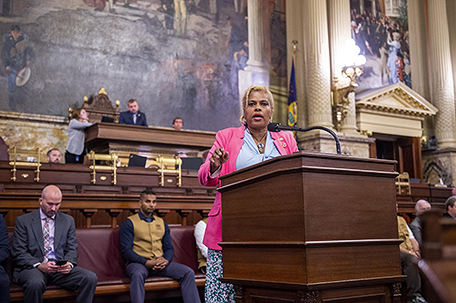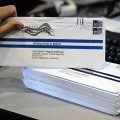
ABOVE PHOTO: Rep. Davidson implores her colleagues to vote against dangerous and undemocratic legislation that would make it harder for people to vote and infringe on their rights. House Bill 1300 is the blueprint of a GOP effort across the nation to suppress the votes of people who are against their public policies. (Photo/Pa.House)
As the Senate prepares to send Gov. Tom Wolf a partisan bill that would infringe on voting rights in Pennsylvania, state Rep. Margo Davidson (D-164th Dist.) is introducing the legislation county election officials and voting experts requested over the course of 10 public hearings on the issue.
Davidson, who is Democratic chairwoman of the House State Government Committee, said that while Wolf is expected to veto H.B. 1300 because it ignores many voter- and county-focused measures to improve Pennsylvania’s elections process in favor of hyper-partisan voter suppression tactics based on false claims of election fraud, there remains a need to build on the successes of Act 77 of 2019 and help counties avoid extreme pressure on the next Election Day, while ensuring voters’ ballot access and rights.
“Governor Wolf is right to veto any and all legislation that attempts to suppress the votes of Pennsylvanians, especially legislation that is based on false, dangerous and repeated claims of fraud by the Republican majority,” Davidson said.
“If this farce continues, the public hearings that the dedicated elections officials and voting experts took time to attend will be reduced to nothing more than sham, disguising the true intent to suppress votes and pay homage to the big lie of widespread voter fraud.
“Out of respect for the requests of 50 legitimate experts and officials throughout 30 hours of testimony, I am introducing the measures they really called for: greater efficiency and support, not additional audits, cumbersome new processes or voter ID and other limits on voter access,” she said.
Davidson’s first bill (H.B. 1704) would allow for two weeks of ballot pre-canvassing by county election workers in order to lessen the burden on them, a provision repeatedly requested by election officials and a provision Davidson believes should be enacted immediately if no other positive voting reforms are put in place.
Davidson’s more comprehensive bill (H.B. 1703) would, among other things:
• Allow county election boards to pre-canvass ballots seven days prior to Election Day, a request repeated throughout the 10 State Government Committee hearings.
• Outline the requirements for ballot return sites and secure ballot return receptacles, or drop boxes, where completed ballots can be returned, but not restrict them. Drop boxes played an important role in COVID-19 mitigation, were popular among voters and embraced by counties.
• Require risk-limiting audits to be conducted by the Department of State in conjunction with county boards of elections after each election and be completed by the third Friday following the election.
• Allow electors to return a completed ballot of an elector for whom they are appointed as power of attorney with valid proof for absentee and mail-in ballots, in addition to allowing a voter to return a completed ballot of an elector in his or her household.
• Provide for curing of absentee and mail-in ballots where the declaration of the elector is incomplete or are unsigned or undated, as well provide for absentee ballots or mail-in ballots for which it is discovered during the pre-canvassing or the canvassing process that the official election ballot envelope was not included or unidentifiable marks are placed on the envelope, in which case the county board would place and seal the ballot into an empty official election ballot envelope and place the secured envelope with the other removed official election ballot envelopes to be tabulated.
Voters should not be punished for making simple and legitimate mistakes when completing their ballots.
• Make permanent the mail-in voting list by requiring that a mail-in ballot application mailed to an elector, which is completed and timely returned by the elector, shall serve as an application for any and all primary, general or special elections to be held in the remainder of that calendar year and for all elections to be held in subsequent years until an elector requests to be removed.
This provision would reduce confusion among voters, as well as make the process easier for counties to handle.
According to Davidson, the bills were referred to the House State Government Committee, where she hopes they will receive fair consideration.

















Leave a Comment